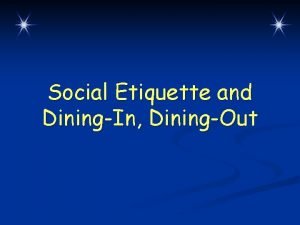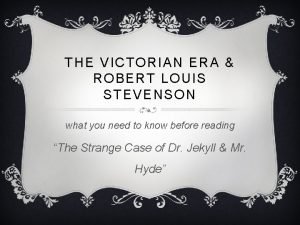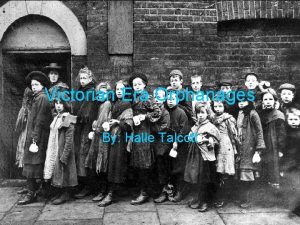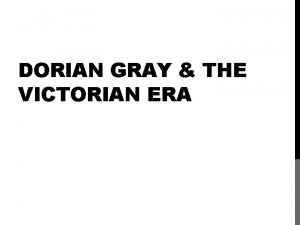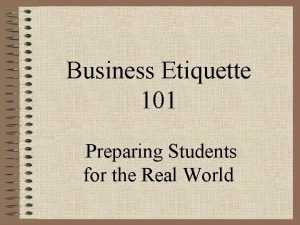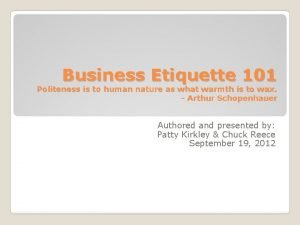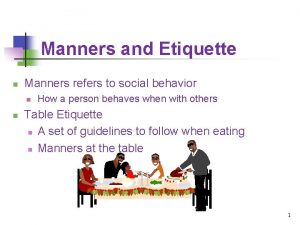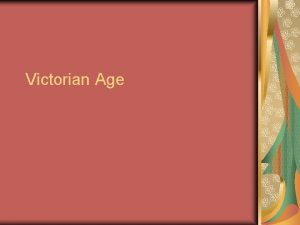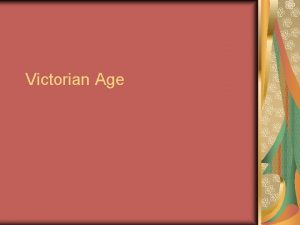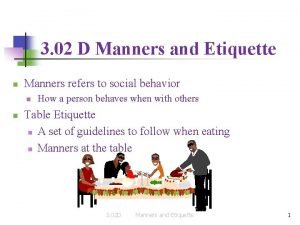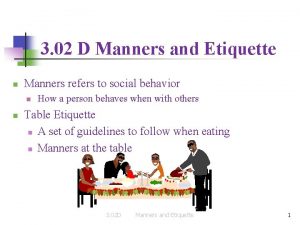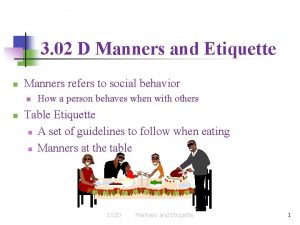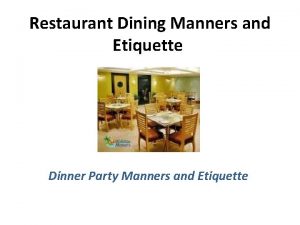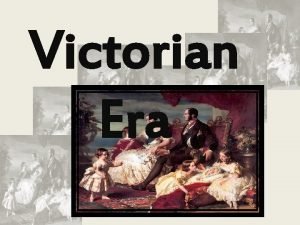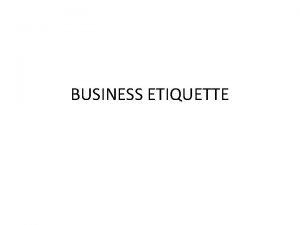VICTORIAN ERA Social Etiquette ETIQUETTE AND MANNERS VICTORIAN










































- Slides: 42

VICTORIAN ERA Social Etiquette

ETIQUETTE AND MANNERS: VICTORIAN ERA v. Here are some of our favorite practices of social etiquette from the Victorian Era. (Requires a sense of humor!)

1)BATHING v. A simple washing out of the eyes is not sufficient. The complete bathing of the body -once each dayis of the utmost importance. (Not more than a quart of water is necessary, preferably rainwater. )

2)HAIR v. The head should be washed occasionally with soap and water. v. When the hair is inclined to (έχουν την τάση να ) be harsh and dry, a moderate application of bear's grease (γράσο) or other dressing (μείγμα) should be used.

3)SKIN v Beware of exterior applications (εξωτερικές εφαρμογές) of cosmetics. v Instead, once every two or three months, take a teaspoon full of powdered charcoal (καρβουνόσκονη) mixed with sweetened water (γλυκό νερό) or milk. (ζαχαρούχο γάλα) This will prove efficacious in making the complexion(επιδερμίδα) clear and transparent.

4)KISSING v. Upon the meeting of intimate friends, among ladies, at the private house, the kiss as a mode of salutation is yet common; but this is a custom which ought to be abolished(καταργηθεί) for physiological and other reasons.

5)BOWING v. A gentleman should not bow from a window to a lady on the street (!) , though he may bow slightly from the street upon being recognized by a lady in a window (!). Such recognition should, however, generally be avoided, as gossip is likely to attach undue(υπερβολική) importance to it when seen by others.

6)DIGNITY v. To greet someone by saying "Hello, old fellow" indicates ill-breeding(κακή ανατροφή). If you are approached in this vulgar(χυδαίος) manner, it is better to give a civil reply and address the person respectfully, in which case he is quite likely to be ashamed of his own conduct.

7)SMALL TALK v No topic of absorbing interest (interesting topic) may be admitted to polite conversation. It might lead to discussion.

8)CONDUCT TO AVOID AT THE BALL v. No gentleman should enter the ladies' dressing room at a ball.

9)CARD-PLAYING v. If possible, do not violate the rules of the game and do not cheat. Should you observe anyone cheating, quietly and very politely call it to his attention, and be careful that you do not get excited. People who experience ill-feeling at the game should avoid playing.

10)MARRIAGE v. Anyone with bright red hair and a florid complexion should marry someone with jet-black hair. The very corpulent (obese) should marry the thin and spare (λιτοδίαιτος), and the body, coldblooded (ψυχρόαιμος) should marry the roundfeatured, warm hearted, emotional type.

11)HUSBANDS v. Always leave home with a tender goodbye and loving words. They may be the last.

12)TRAIN TRAVEL v. People with weak eyes should avoid reading on trains, and those with weak lungs (πνεύμονες) should avoid talking.

13)STREET ETIQUETTE v. When crossing the pavement ( πεζοδρόμιο ), a lady should raise her dress with the right hand, a little about the ankle. To raise the dress with both hands is vulgar and can only be excused when mud is very deep.

RULES OF SOCIAL ETIQUETTE v. For those in the upper echelons of society , rules such as the proper forms of address, and even what to wear (including which pieces of jewelry would be appropriate) were all considered very important. For the lower class , the poor, there wasn’t time for etiquette.

WHAT TO AVOID … v. The Upper and Upper-Middle Class from the slightest burp ( social ruin if it was heard ) to how a gentleman spoke to a young lady , Victorian society was greatly concerned with every aspect of daily life.

v. From the moment the Upper Class left their beds their days were governed by Do’s and Don’ts.

v The Horror of social ostracism was paramount ( κυρίαρχος ). To be caught in the wrong fashion at the wrong time of day was as greatly to be feared as addressing a member of society by the wrong title. v It was important to know whom you could speak with – especially if you hadn’t been properly introduced. For a woman , being asked to dance by a complete stranger could posse an etiquette problem which might have repercussions(επιπτώσεις)for days.

v. Young Ladies were constantly chaperoned(συνοδευόμενες). To be found alone with a gentleman who was other than family was tantamount (ισοδυναμεί)to social death. Her reputation(φήμη) would be ruined and her gentleman companion would find himself the object of gossip , and most usually derision(χλευασμός).

v. The established career for society women was marriage – full stop. They were expected to represent their husbands with grace and provide absolutely no scandal. Charity work would be accepted , but only if it was very gentile … sewing for the poor , or putting together food baskets.

v. Gentlemen had to keep track of when it was proper to either smoke or have a glass of sherry in front of ladies. When to bow and to whom to tip your hat could cause gossip if the wrong decision was made.

v. Members of Victorian society kept busy with parties , dances , visits , dressmakers , and tailors(ράφτες). Keeping track of what other people in your social class were doing was also a full-time occupation.

THE PEOPLE IN THE MIDDLE v. Being a servant in one of the grand Victorian houses was a position which guarantee shelter and food. However , there was etiquette to be learned v. The upper class was never to be addressed unless it was absolutely necessary. If it was the case , as few words as possible were to be uttered(ειπωθεί).

MA’AM AND SIR v. Using the proper title was of the utmost importance. “Ma’am” or “Sir” was always appropriate. If “Ma’am” was seen , it was necessary that you ‘disappear’, turning to face the wall and avoiding eye contact.

v. Life was easier , though , amidst(ανάμεσα) your fellow servants. Although private fraternization was frowned upon (αποδοκιμαζόταν), it wasn’t against the rules for those ‘below stairs’ to enjoy singing , dancing , and other social activities together.

v. Quite often the ‘upper class’ of the servant world , the butler and housekeeper , would put aside their lofty roles in the household and join their fellow servants in gaiety (ευθυμία). But come the morning , they would reign supreme once again

v. Having a profession was another way of being a member of the middle class of Victorian society. Shopkeepers , doctors , nurses , a schoolmaster , or parish priest were all notable professions.

v. Often times , the only difference between being a member of the upper-middle and the middle class was the amount of wealth you had gathered , and how it was flaunted. v. Another indicator was the number of servants you employed. Having more than one servant was a sure sign that you had money.

v. Sometimes , the ‘uppers’ and the ‘middlers’ would mingle (ανακατώνομαι). If the proper introductions could be managed , it was possible for a tradesman to receive backing from a prominent ‘upper’ member. With a successful business deal , both parties could increase their wealth and for the ‘middler’ , their station in life.

‘THE POOR’ WERE INVISIBLE… v. The Lower Class Victorian Society did not recognize that there was a lower class. v. They might work as : Chimney sweeps , ratcatchers , workers at factories ( they had no place in the echelon of the upper class ) – although their services would be needed from time to time

POPULAR POINTS OF ETIQUETTE DURING THE VICTORIAN ERA v Victorian girls were trained early on in life to prepare herself for a life dedicated to home and family if she married, and charity if she didn’t. And young ladies , though advised on the importance of catching a man , were warned not to be too liberal in display of their charms. Meekness and modesty were considered beautiful virtues.

v. Invitations should be sent at least seven to ten days before the day fixed for an event , and should be replied to within a week of their receipt , accepting or declining with regrets.

v. Never lend a borrowed book. Be particular to return one that has been loaned to you, and accompany it with a note of thanks. v. Rise to one’s feet as respect for an older person or dignitary. v. What can I say? A true gentleman tips their hat to greet a lady, open doors. And always walks on the outside.

v. Conversation is not to talk continually , but to listen and speak in your turn. v. Do not monopolize conversation or interrupt another speaker to finish his story for him. v. And as for the Gentlemen, they should be seen and not smelled. They should use but very little perfume , as too much of it is in bad taste.

v. When introduced to a man , a lady should never offer hand , merely bow politely and say , “ I am happy to make your acquaintance. “ v. While courting , a gentleman caller might bring only certain gifts such as flowers , candy or a book. A woman could not offer a gentleman any present at all until he had extended one to her, and then something artistic, handmade and inexpensive was permissible.

v. A gentleman may delicately kiss a lady’s hand, the forehead , or at most, the cheek. v. If you are conversing with people who know less than you , do not lead the conversation where they cannot follow.

v. Victorians take the rules of propriety very seriously. It is who they are. Of one does not confirm , they are considered outcasts In proper society.

EDUCATION

v. The educating of young women would not be complete without the teaching of refined deportment. Social living and decorum is as much a part of their curriculum as are math , literature and other academic subjects. There have been many books written to instruct both young women and men on the proper rules of conduct. They know that proper conduct and decorum is not only a measure of social standing and success, but was necessary to be looked upon as a means of entering the growing upper classes.

Clothes Bowing

MARGARET & PHLIPPA
 What is the first rule in social correspondence
What is the first rule in social correspondence Renaissance period floral arrangements
Renaissance period floral arrangements Floristry history
Floristry history Victorian era vs elizabethan era
Victorian era vs elizabethan era Good and bad manners essay
Good and bad manners essay Difference between etiquette and manners
Difference between etiquette and manners Manners in pride and prejudice
Manners in pride and prejudice Robert louis stevenson victorian era
Robert louis stevenson victorian era Techniques and themes in victorian poetry
Techniques and themes in victorian poetry Education during the victorian era
Education during the victorian era Is the victorian era named after queen victoria
Is the victorian era named after queen victoria Victorian era condoms
Victorian era condoms The victorian era timeline
The victorian era timeline The victorian age summary
The victorian age summary Victorian quotes
Victorian quotes The victorian age characteristics
The victorian age characteristics Victorian era marriage expectations
Victorian era marriage expectations Victorian orphanages
Victorian orphanages Cars in the victorian era
Cars in the victorian era The picture of dorian gray victorian era
The picture of dorian gray victorian era Notes on the yellow wallpaper
Notes on the yellow wallpaper Victorian era monsters
Victorian era monsters Jane eyre victorian novel
Jane eyre victorian novel A christmas carol webquest
A christmas carol webquest Quiz 2 the baroque era
Quiz 2 the baroque era Creí que era una aventura y en realidad era la vida
Creí que era una aventura y en realidad era la vida Vi uma estrela tão alta
Vi uma estrela tão alta Define social graces
Define social graces Apa itu social thinking
Apa itu social thinking Social thinking social influence social relations
Social thinking social influence social relations Social media etiquette for college students
Social media etiquette for college students Business etiquette 101: social skills for success download
Business etiquette 101: social skills for success download Politeness is to human nature what warmth is to wax
Politeness is to human nature what warmth is to wax Etiquette meaning
Etiquette meaning Christian grooming and manners honor
Christian grooming and manners honor Restoration comedy of manners
Restoration comedy of manners Aliping namamahay
Aliping namamahay Kalumbiga
Kalumbiga Regency era social classes
Regency era social classes Social darwinism paralleled the economic doctrine of
Social darwinism paralleled the economic doctrine of Comic strip about being polite
Comic strip about being polite Comedy of manners in restoration age
Comedy of manners in restoration age The rivals is a comedy of manners
The rivals is a comedy of manners
